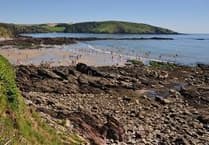A wildlife project part-funded with lottery money is aiming to boost more than 60 of South Devon’s most endangered insect and plant species.
The £4.4m Life on the Edge (LOTE) project, led by the South Devon National Landscape (SDNL) association, will focus on helping to repopulate the coastline from Brixham to Plymouth, where unique insect species are most at risk of extinction.
To illustrate the scale of the crisis, one of Britain’s rarest insect species, the six-banded nomad bee, which is found only in Prawle Point, near Salcombe, could become extinct within five years if nothing is done.

The aim is to secure the future of 96 species in total, as it could in turn help to boost bird, reptile and plant populations.
This will involve the creation of flower-rich ‘B-Lines’ along the coast to help insects move through the landscape.
Project manager Rob Skinner pointed out that wildflower-rich meadows are particularly beneficial to bumblebees, as they cannot travel long distances without feeding.

Farmers, landowners and the wider community will also be asked to help restore these meadows.
Mr Skinner said the decline in local species is due to a range of factors, including habitat loss, climate change and intensive farming.
“It could be due to coastal squeeze, where farming is pushing these species close to the edge and you’re losing a lot of natural habitat,” he said.
SDNL pointed out that farmers in South Devon were not generally farming intensively as they are in East Anglia, where the fields are much bigger and a lot more cereals grown.
Nonetheless, the team said it would be working with local farmers on how to grow cereals and other crops that present better feed sources to invertebrates.
Given the impact on the environment of climate change and intensive farming, Mr Skinner was however asked whether a robust response was needed to change farm practices which rely heavily on pesticide use.
“It’s a case of bringing the people along with the message, rather than say it’s a massive issue and we cannot deal with it. We’re trying to break it down to a lower level where people can start to digest that and go ‘yes, it is scary, but there are small steps that we can take’ – that goes for landowners and farmers,” said Mr Skinner.
Looking ahead, he said he hoped there would be “tangible changes” to the landscape when the project ends in five years’ time, including having larger areas all along the coastline for insects to move through.



